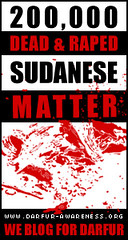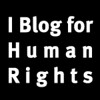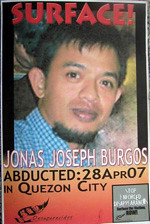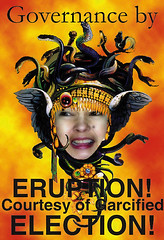Undocumented Children Migrants Casualties of Migration & Poverty
United Nation’s expert draws attention to the situation of children affected by migration in a post by Sunchild at Diaspora Journey on the occasion of the International Migrants Day on 18th of December. The statement issued for the occasion by the Chairperson of the Committee on Migrant Workers, Abdelhamid El Jamri, and the special rapporteur on the human rights of migrants, Jorge Bustamante, hopefully signals a new approach, to quote:
Related article:
Over the last number of years, the international community has paid much attention to the economic dimension of migration and to the links between migration and development, but it has paid much less attention to other aspects of migration, such as the rights of the migrant workers and members of their families.Migrant workers worldwide are a staggering 100 million and there are 20% or 20 million children of these workers are social cost that governments fail to factor in this phenomenon. All that governments see like the Garcified administration of Gloria Macapagal Arroyo are the remittances of the Overseas Filipino workers (OFW) that props up the Philippine mismanaged economy and yet are in denial as to the sufferings it has caused their people. While they suffer and the children of the workers suffer even more thieves and scammers in the Gloria Macapagal Arroyo administration are busy raiding the government coffers. The bounty that is up for grabs causing our politicians to suffer from selective blindness unable or in denial those problems with dire consequence for the undocumented children exist, a quote from Veronica Uy’s article:
Today, as we celebrate International Migrants Day 2008, we would like to draw your attention to the many children whose lives are affected by migration.
We are particularly concerned at the situation of unaccompanied children, who migrate on their own separated from both parents and other adults taking care of them. These children face greater risks of becoming victims of trafficking and various forms of exploitation, including sexual and economic exploitation. They are often discriminated against and denied access to food, shelter, housing, health services and education. Unaccompanied migrant girls are at particular risk of gender-based violence and sexual exploitation and are often exploited in domestic work in servitude like situations. In many countries, unaccompanied migrant children are routinely denied entry to or detained by border or immigration officials without the special care required by their young age.
Children of migrants who move with their parents to live in another country also face many obstacles, including social stigma and discrimination often limiting their opportunities. Especially, when their parents are irregular migrants, these children may face insurmountable difficulties with respect to their access to even the most basic rights and needs, such as health care and education. We would like to hereby stress that each child of a migrant worker, irrespective of the migratory status of their parents, has the right of access to education and urgent medical care on the basis of equality of treatment with the nationals of the State concerned.
Silan said the flash points for this phenomenon include Malaysia, Japan, Taiwan, and Korea (for Filipino and other Asian migrants), and Europe (for African migrants).As it is undocumented migrant workers do not enjoy basic rights and if they are subjected to stifling conditions their children suffers even more exacerbated by their inability to speak for themselves as reported by Camila Olson of Refugee International:
"The magnitude is so immense and the lack of attention to their condition is equally gaping. Governments must look at the figures, not just of past remittances, but of the number of children affected. They are part of the cost of the migration process," she said.
Silan said that in many instances, not even the migrant workers enjoy their rights, much less their dependents.
"For instance, working conditions do not allow for freedom of movement; they are confined in a common housing area, 10 to 15 to a small room, with a CCTV (closed-circuit television) monitoring their every move," she said.
Decades of irregular migration to Sabah in eastern Malaysia have resulted in large numbers of undocumented children of migrants from the Philippines and Indonesia who are potentially at risk of statelessness.It is bad enough that Filipino migrant work exacts toll on children left behind at home, what more if they were left behind in a foreign soil (Sabah) to fend for themselves in a society with a mindset that excludes them? If you are interested in advocating for the rights of migrant workers and their children read the UN 1990 Convention, On the Protection of the Rights of All Migrant Workers and Members of their Families.
Undocumented migrants in Malaysia are targets for arrest and deportation, which in some cases has left their children alone on the street. Children of migrants who are born in Malaysia may be undocumented if they do not possess a birth certificate. In addition, if a child’s parents have been deported and they have no other family ties in Malaysia, it may be difficult for them to trace their heritage back to their parents’ country of origin in order to apply for a passport. If no government recognizes these undocumented children as nationals, then the children are vulnerable to statelessness.
Malaysia is a signatory to the Convention on the Rights of the Child, which states in Article 7 that all children have a right to acquire nationality at birth. However, Malaysia does not grant citizenship by birth, choosing not to adhere to the principle of jus soli. Individuals can only apply for citizenship if one parent is a citizen of Malaysia. Foreign parents can register their children for birth certificates, but the certificates are stamped orang asing (foreigner), reflecting the fact that the parents are not citizens of Malaysia.
Refugees International recently traveled to Sabah and interviewed migrants of Filipino and Indonesian descent. Children with orang asing on their birth certificates, as well as those who do not possess a birth certificate, cannot go to government schools in Sabah. Private school is an option but the cost is prohibitive for most families. There are church and community organizations in Sabah that offer private education at a reduced cost. One such non-governmental organization has worked to educate almost 5,000 undocumented children in eastern Sabah, including those on the oil palm plantations, with the support of local authorities.
The Government of Malaysia has been cracking down on irregular migrants in the country. In Sabah, raids are conducted in housing areas where the migrants live and in markets and public areas where many work. Those arrested are deported back to their country of origin. Many children whose parents have been deported and who do not have any other family or guardian in Sabah end up living and working on the street at a very young age, often in fish markets. A local community worker told RI, “It’s those who have nobody who are there [in the fish markets].”
The exact number of street children in Sabah is unknown, but they are estimated to be in the thousands, mostly of Filipino descent. There is strong local resentment of undocumented migrants in Sabah, and the street children are portrayed as a criminal element by authorities and the media. The children working at the fish markets are wary of outsiders and are under constant threat of raids by police. In 2006, the police arrested about 160 street children who were placed in detention. Those with family contacts were eventually released, but there is no information on the whereabouts of the others.
Zugoh, a 12-year-old boy of Filipino descent, works through the night at a fish market in Kota Kinabalu. He pushes a heavy wooden cart hoping that customers will allow him to transport their purchases to their car. Zugoh earns around 1 MYR, or 30 cents per customer. Zugoh does not have a father. He has a mother, but he does not stay with her. Zugoh told RI that he sleeps somewhere on the street near the fish market. He does not go to school, and he has no identity documents.
Local sources in Sabah told RI that the children living on the street often do not possess identity documents like a birth certificate. There are several reasons for this. In order to obtain a birth certificate in Malaysia, it is necessary to produce a valid passport for each parent and a certificate of marriage, documents which many migrants do not possess. In addition, those who work in rural areas are sometimes not able to travel to the national registration authority to apply for the birth certificate.
Under the UN Convention relating to the Status of Stateless Persons, the term “stateless person” refers to anyone who is not considered a national by any State under the operation of its law. The absence of a birth certificate does not mean that a child is stateless. However, when a child does not have a birth certificate and she has no other way of tracing her family’s country of origin to apply for a passport, then the child may indeed be stateless or at risk of statelessness.
Interviews with migrants suggest that both Indonesia and the Philippines grant citizenship through the nationality of the parents, adhering to the principle of jus sanguinis. Currently, individuals of Indonesian and Filipino descent must travel to their country of origin in order to apply for a passport. However, there is an Indonesian consulate in Sabah which could assist those of Indonesian descent with the processing of identity documents. There is no permanent consular presence for the Philippines, however, due to an unresolved dispute between the governments of Malaysia and the Philippines over the ownership of Sabah.
The existence of undocumented children in Sabah who may be vulnerable to statelessness is a complex and politicized issue. Recognizing the problematic situation, Malaysian non-governmental organizations and the Malaysian Human Rights Commission (SUHAKAM) have conducted fact-finding missions to Sabah. Both the Office of the UN High Commissioner for Refugees (UNHCR) and the UN Children’s Fund (UNICEF) report that their offices are monitoring this issue. While steps are being taken to assist undocumented children in Sabah, many are still in need of increased protection and access to their basic rights, including an identity, a nationality, and education.
Policy recommendations
- The Government of Malaysia should ensure that all births in Malaysia are registered.
- The Government of Malaysia should convene discussions on the issue of children vulnerable to statelessness in Sabah to develop a strategic plan of assistance involving all concerned parties: the Governments of Indonesia and the Philippines, UNHCR and UNICEF, Ministers of Parliament, Malaysian NGOs and migrant community leaders.
- The Government of Malaysia should uphold its commitments under the Convention on the Rights of the Child and allow free primary education to undocumented children.
- The Government of Malaysia should cease the arrest and detention of undocumented children in Sabah.
- The Government of the Philippines should ensure that migrants from the Philippines have regular access to representatives of the Philippine Embassy to receive assistance with the processing of identity documents for children of Filipino descent.
- UNHCR undertake a survey to identify the numbers of children who are stateless or at risk of statelessness and take concrete steps to prevent and reduce statelessness.
- UNICEF increase advocacy efforts on the protection of undocumented children in Sabah and support local community education programs that are already in place
- In cooperation with the Government of Malaysia, UNICEF facilitate the registration process to ensure that all children are registered at birth.
Related article:
- Chip Tsao Apologized, What Now?
- Chip Tsao & War at Home Satire, an Opportunity for Philippine Political Cheapies to Jump the Bandwagon
- Chip Tsao satire sparking a controversy
- Illegal Filipino Migrant Street Children in Sabah, Malaysia
- Pagpag, A disgusting Glimpse on Poverty
- Bloggers Unite-Against Peddlers of Human Misery & Corruption
- Filipina OFW being Kept as Sex Slave, an RX
- Children of Poverty in the Philippines
- Children Casualties of Poverty in the Philippines

POGB will not sell, exchange, use or allow any 3rd party access to your email for
any other purposes without exception, email exclusively for article updates only.
























5 Speak Out:
What?????? This is about undocumented migrant children and you respond with some legal gobbledygook...... no wonder people and especially children are suffering.
The Philippines has got to do something about these undocumented children and should take it up with Malaysia at the highest level.
This sort of phenomemnon cannot be allowed to degnerate, it's inhuman.
Those children cannot remain stateless.
Anna,
A consular office would have done the job but because of the territorial dispute setting up a consular office meant RP recognizes Sabah as part of Malaysia.
The irony is that their plight never seems to get noticed because they are not your typical remittance "rich" OFWs.
In the meantime while both governments are not tackling the issue there is no resolution in sight for these street children.
hi pedestrian, ok poh kayo at nabasa ko kayo sa blog ni blogsurdities. sa totoo lang poh, mahirap yan, kasi muslim mga malaysians. wala poh silang pakeelam sa mga bata at ginagawa lang nga nilang mga human shields ang mga batang yan so wah silang pakeelam sa kanila. di naman sila tender and kind sa mga bata o maawain. ayun, may kidnapping nanaman.shet!
Nancy,
Ang problema kasi masyadong masalimuot dahil sa isyu ng territorial claim sa sabah.... hindi lang naman problema ng Malaysia ito dahil ang atin pamahalaan ay may tungkulin din na pangalagaan an kanyang mamayan. Ngunit sa isyung ito dahil nakabinbin ang pa-aari ng Sabah ang malaysia bilang isa sa mga pumirma sa UN convention ay mas malaki and pananagutan na kilalanin ang mga batang isinilang sa Sabah biglang kanilang citizen.
Sa aking pagkakaalam at maari akong magkamali and Sabah ay hindi purong Muslim dahil malaki ring sekto ng kanilang lipunan ay kristiyano. Ang relihiyon ay hindi dapat maging usapin sa problema ng mga bata sa kalye at ang ating dapat pagtuunan ng atensyon ay ang obligasyon ng Malaysia bilang isa sa mga pumirma sa UN convention.
Post a Comment